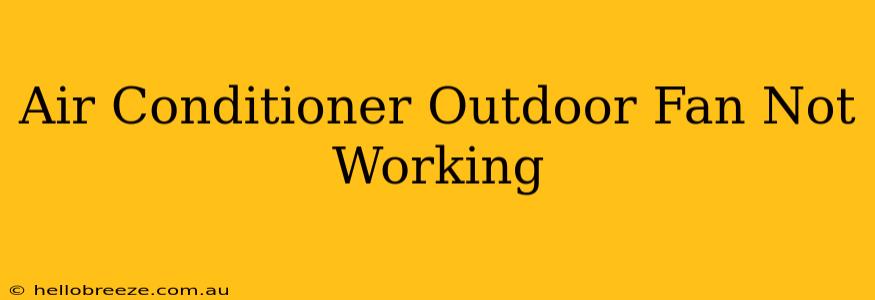Is your air conditioner blowing hot air? A common culprit is a malfunctioning outdoor fan motor. This comprehensive guide will help you troubleshoot and, in some cases, even repair a non-working outdoor AC fan. We'll cover everything from simple checks to more involved repairs, empowering you to get your cool air back on!
Understanding Your AC's Outdoor Unit
Before diving into troubleshooting, let's understand the role of the outdoor fan. This crucial component draws in outside air, which is then used to dissipate heat from the refrigerant. If this fan isn't working, the refrigerant can't cool down properly, leading to a system failure and hot air indoors.
Common Causes of a Non-Working Outdoor Fan
Several issues can cause your air conditioner's outdoor fan to fail. Here are some of the most frequent culprits:
- Blown Capacitor: The capacitor stores electrical energy needed for the fan motor to start. A faulty capacitor is a common reason for a non-spinning fan.
- Bad Fan Motor: The motor itself might be burned out due to age, overheating, or electrical surges. This is often a more serious issue requiring professional attention.
- Wiring Problems: Loose connections, damaged wiring, or tripped breakers can prevent power from reaching the fan motor.
- Frozen Condenser Coils: Ice buildup on the condenser coils can restrict airflow and strain the fan motor, ultimately leading to failure. This often points to another underlying problem like a refrigerant leak.
- Overgrown Vegetation: Debris, leaves, and vines obstructing the airflow around the outdoor unit can overload the motor and cause it to fail.
- Overheating: The fan motor might overheat due to limited airflow, leading to its malfunction.
Troubleshooting Your Air Conditioner's Outdoor Fan
Let's tackle troubleshooting step-by-step. Always prioritize safety! Turn off the power to the unit at the breaker before performing any checks or repairs.
1. Check the Power Supply
- Circuit Breaker: Check your home's electrical panel to ensure the breaker supplying power to the air conditioner hasn't tripped. Reset it if necessary.
- Wiring: Visually inspect the wiring connections to the outdoor unit. Look for any loose, corroded, or damaged wires. If you're uncomfortable with electrical work, call a professional.
2. Inspect the Capacitor
- Location: The capacitor is usually a cylindrical component near the fan motor.
- Visual Inspection: Check for any visible damage, bulging, or leaking.
- Testing (Advanced): You can test the capacitor using a multimeter. This requires electrical knowledge; if unsure, seek professional help. A faulty capacitor needs replacement.
3. Examine the Fan Motor
- Visual Inspection: Check for any obvious damage to the fan motor itself. Look for signs of burning or seizing.
- Testing (Advanced): Testing the fan motor requires electrical expertise and a multimeter. A faulty motor usually needs replacing.
4. Check for Obstructions
- Clear the area: Remove any debris, leaves, or vegetation that might be obstructing airflow around the outdoor unit. Ensure adequate clearance for proper ventilation.
5. Investigate Frozen Coils
- Check for ice: If you find ice buildup on the condenser coils, this is a serious issue that often requires professional AC repair. It usually indicates a refrigerant problem or other malfunction.
When to Call an HVAC Professional
While some minor issues can be addressed with basic troubleshooting, it's crucial to know when to call a qualified HVAC technician:
- Electrical Work: If you're uncomfortable working with electricity, always call a professional.
- Refrigerant Leaks: Suspected refrigerant leaks require professional attention due to safety and environmental concerns.
- Complex Repairs: Replacing the fan motor, capacitor, or dealing with frozen coils is best left to trained technicians.
Regular maintenance is key to preventing these problems. Schedule annual AC maintenance to ensure optimal performance and longevity. A little preventative care can save you significant repair costs in the long run!
By following these steps, you can successfully troubleshoot and possibly fix your air conditioner's outdoor fan. Remember, safety always comes first. If you are uncertain about any step, consult an HVAC professional to ensure your safety and the proper repair of your system.

